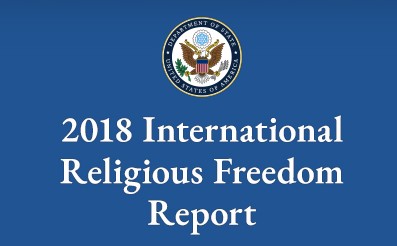27 June 2019 – Last week, on 21 June, the United States (US) Department of State (DoS) published its 2018 Report on International Religious Freedom, analyzing the status of religious freedom globally. This year’s report on Bahrain highlights the degree to which minority religions are free to practice in the kingdom, but also notes multiple instances of government-sanctioned discrimination against members of Bahrain’s majority Shia population – including the targeting of religious leaders. While Americans for Democracy & Human Rights in Bahrain (ADHRB) welcomes the State Department’s acknowledgment of the Bahraini government’s role in discrimination against Shia Muslims, we are concerned that the report stops short of providing specific recommendations to address the systemic discrimination of the Bahraini Shia majority. We call on the US to provide such recommendations to end religious discrimination in Bahrain and to urge the Bahraini government to promote basic human rights for the Shia population.
Freedom of religion in Bahrain is largely guaranteed under the constitution, provided individuals do not “infringe on the fundamental beliefs of Islamic doctrine.” In the International Religious Freedom Report for Bahrain, DoS finds that minority religious groups, including Christians, Buddhists, Jews, Sikhs, and Hindus, were able to practice freely in the kingdom “without fear of interference from the government.” However, Bahrain’s majority Shia majority population was not provided the same freedoms and faced noticeable discrimination.
The Religious Freedom Report notes that the Bahraini government continued to question, detain, and arrest Shia clerics and community members, while at least 25 individuals, including Shia clerics, were harassed and detained by Bahraini authorities, threatened with imprisonment, and “interrogated for the content of their sermons” ahead of Ashura. Reports further surfaced of security forces removing Ashura-related commemorative displays and banners – a pattern previously documented by ADHRB – based on claims that they violated zoning laws or contained political messaging. The report neglected to detail the several cases of Shia prisoners who were also targeted and harassed around Ashura. Shia detainee Ahmed Abdulla AlAjaimi was transferred to solitary confinement without reason and beaten by prison authorities – the punishment stemmed from possession and display of items and inscriptions commemorating Ashura. The report neglected to go into detail on the fact that Shia prisoners were also targeted and harassed around Ashura. Additionally, the detention of 14 Shia individuals was renewed without reason. While the report highlighted the assault of Hajer Mansoor, Najah Yusuf, and Medina Ali after they were denied the right to participate in religious commemorations of Ashura, the report omitted reports that authorities in Isa Town Women’s Prison withheld religious materials for the exercise of Ashura religious rites despite prisoners’ requests for books.
The State Department’s report also emphasizes the restrictions placed on Shia, as well as increased harassment, ahead of the November 2018 elections. Sheikh Ali Salman, the former Secretary General of the dissolved Shia political opposition group Al-Wefaq, was sentenced to life imprisonment on espionage charges just weeks before the elections. Additionally, a former Shia member of parliament was detained for social media posts calling for a boycott to the elections. In the lead up to elections, an amendment to Bahrain’s election law banned former members of dissolved Shia opposition political societies from seeking or holding elected office. Despite these findings, the State Department still welcomed Bahrain’s elections and called them “inclusive, peaceful, and democratic,” signaling dissonance between the State Department’s reporting and public statements.
Systematic discrimination persisted in the kingdom’s economic sectors and in citizenship processes while the kingdom emphasized religious tolerance abroad. DoS notes that , in an effort to bolster its Sunni population, Bahrain continued to recruit Sunni immigrants for Bahrain’s security forces and provided them with expedited naturalization services while simultaneously excluding Bahraini Shia from the security sector. What the report fails to discuss however, is that this policy is a likely result of the Bahraini government’s desire to over-police its majority Shia population. The State Department highlighted Bahrain’s participation in last year’s Ministerial to Advance Religious Freedom and the announcement that Bahrain would appoint its own Ambassador-at-Large for Peaceful Coexistence and Religious Freedom, but stressed that a year later the position has still not been filled.
“While the State Department has addressed some major roadblocks the Bahraini Shia community faces when it comes to religious freedom, DoS has failed to fully address the extent of religious discrimination against Bahrain’s Shia population and provided no concrete action plan which the kingdom should follow,” says Husain Abdulla, Executive Director of ADHRB. “The refusal to fully outline specific policies to address the extent of discrimination – combined with and the lack of critical engagement by the US to pressure Bahrain to improve the situation – does not take the extra step towards ensuring the protection of religious freedoms for the Bahraini Shia. Such refusal is paramount to enabling and emboldening the Bahraini government to continue to discriminate, and ultimately fails to hold it accountable.”
While the State Department’s 2018 International Religious Freedom report on Bahrain highlights important factors of state discrimination against the Shia majority, it fails to outline a critical set of concrete, policy-based recommendations to address ongoing systematic discrimination. US policy has largely ignored the report’s assessment of religious freedom violations in Bahrain, continuing to increase the amount of arms sales and military assistance to the Bahraini security forces. ADHRB calls on the US government to set forth a detailed outline for the Bahraini government to effectively address and combat systematic discrimination of Bahraini Shia, and to further leverage its influence to halt arms sales until specific conditions are met. Without such proposal and actions, the Bahraini Shia will continue to face systematic discrimination in all facets of life.





